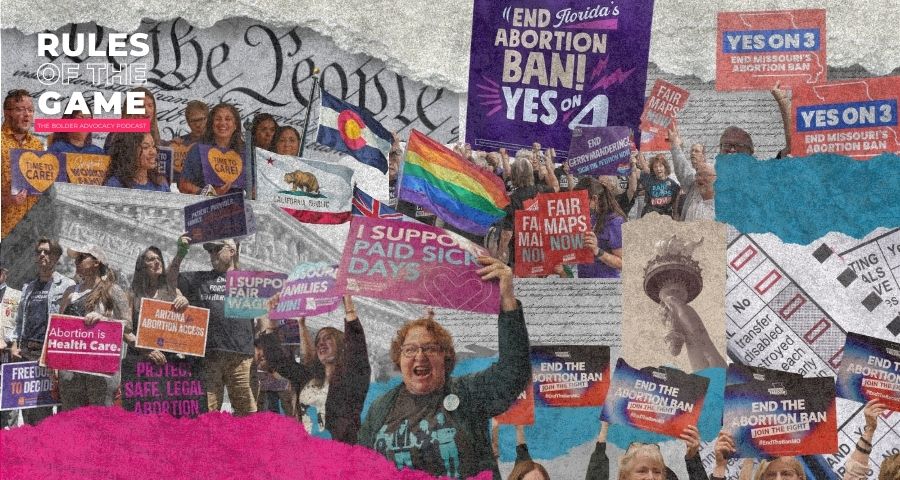The people voted on Tuesday for their choice of candidates and in many states they also voted on ballot measures or ballot initiatives. Ballot measures offer voters a way to participate in direct democracy and can be a powerful tool for change. On this episode, we discuss some of the ballot measures that were up for a vote in 2024 and the results.
As regular listeners will know ballot measures, initiatives, propositions, or bond measures are lobbying. Although they are on the ballot, they are lobbying activity and voters are the lawmakers. Many nonprofits, both 501(c)(3) public charities and 501(c)(4) social welfare organizations participate in ballot measure advocacy within their lobbying limits.
On this episode, we discuss what happened — what did voters decide when it came to the issues of LGBTQ+ equality, reproductive freedom, democracy, and worker protections? We are traveling across the nation to learn what voters decided.
Our Attorneys for This Episode
- Sarah Efthymiou
- Melissa Marichal Zayas
- Susan Finkle-Sourlis
About This Episode
LGBTQ+ Equality
- Voters in CA, CO, and HI used their ballots to approve constitutional amendments that will enshrine the Freedom to Marry into their state constitutions.
- We frequently talk about litigation as an impactful, non-lobbying, form of advocacy. In fact, we had a recent pod episode on that very topic. This past election saw several ballot measures that were introduced to get ahead of potential litigation – specifically cases that might threaten the right to marry.
- Although the 2015 Obergefell decision has made state laws banning same sex marriage moot for now, lessons learned from the Dobbs decision overturning abortion rights demonstrate the need for concrete protections. The proactive, legislatively referred measures in CA (Proposition 3), CO (Amendment J), and HI (Question 1) were intended to safeguard their states’ freedom to marry if a conservative-majority U.S. Supreme Court were to overturn existing protections
- These three ballot measures are likely the first in a wave of proactive measures to fend off (or respond to) any such attacks by a conservative-majority court.
Reproductive Freedom
- Voters in seven states approved ballot measures to enshrine reproductive rights in their state constitutions—including in two states with abortion bans, Missouri and Arizona.
- Missouri’s Amendment 3 establishes a right to reproductive freedom. Arizona’s Proposition 139 establishes a right to abortion.
- Similar reproductive rights measures failed in Florida, South Dakota, and Nebraska. 57% of Floridian voters supported their state’s right to abortion measure, but Florida requires at least 60% of voters to support a constitutional amendment for it to succeed.
- Local ballot measure advocacy can also help safeguard reproductive freedom. San Francisco voters approved Proposition O, a measure that establishes several local protections for individuals seeking access to reproductive health care and their providers. In Amarillo, Texas, voters rejected Proposition A, an abortion travel ban initiative.
Democratic Institutions
- Ohio’s Issue 1 aimed to create a 15-member redistricting commission, made up of citizens across the political parties and ensuring representation from different areas of the state. The initiative failed. Many blamed the confusing language written by the ballot board. The campaign for Issue 1, called Citizens not Politicians, took the issue to State supreme court, which sided with the Ballot board.
- Arizona voters defeated three measures that would have taken away their voice in the democratic process.
- Proposition 137, if passed would have ended term limits for judges. A judge would have a permanent appointment and not have to run for reelection.
- Proposition 134, if passed would have made the signature requirement for a measure to qualify for the ballot more difficult.
- Proposition 136 would have allowed opponents to a ballot measure to challenge any ballot measure before it went to the voters. Opponents could have engaged in costly legal battles, perhaps killing it before voters even got a chance to decide.
- California, Proposition 6, would prohibit prisons from punishing incarcerated people through involuntary servitude. At the time of this recording ballot counting was still underway.
- Nevada, Question 4, passed. Nevada joined eight other states that have passed ballot measures abolishing slavery in prisons.
- Maine, Question 5, asked the question should Maine change its current state flag back to an historical version known as the Pine Tree flag, a simple pine tree with one star in the corner. Voters said no.
Workers’ Rights
- Nebraska voters overwhelmingly passed Initiative 436, which will require employers to provide one hour of paid sick leave for every 30 hours worked.
- According to the initiative’s campaign, over 250,000 Nebraskans currently lack paid sick leave, including more than one-third of full-time and more than three-fourths of part-time employees.
- The initiative was supported by the business community – recognizing that providing paid sick leave increases productivity, recruitment and lowers turnover. It provides a great example of organizations that supports workers’ rights joining forces with members of the business community to effect positive policy change.
- Nebraska was joined by voters in Alaska and Missouri (all traditionally solid Republican states) in passing these progressive pro-worker policies.
Reminders
- Supporting or opposing ballot measures is considered lobbying under federal tax law.
- Ballot measure advocacy may trigger registration and/or reporting requirements under state and local campaign finance laws.

